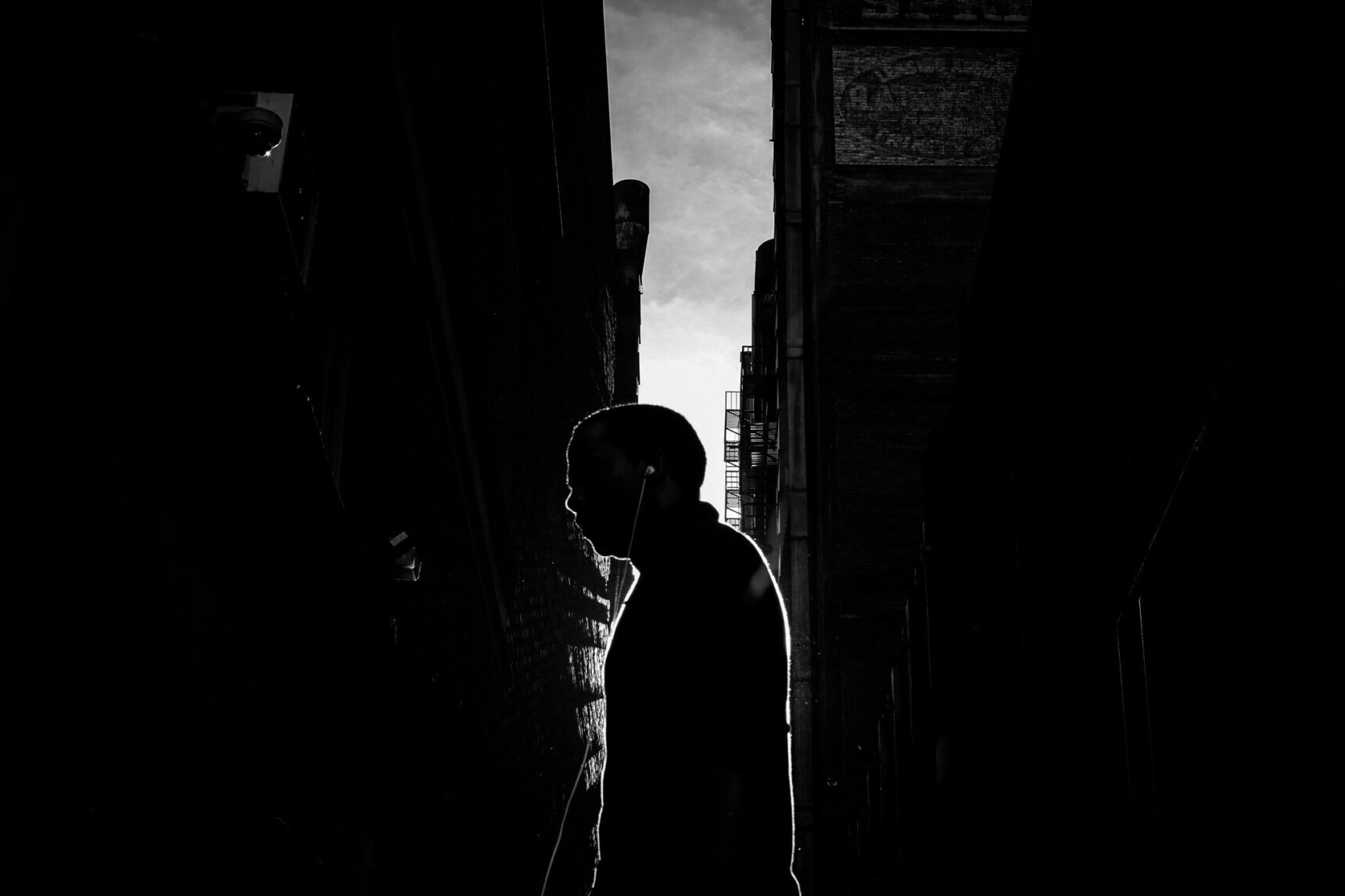He’s one of the most prolific street photographers working today and his trademark black and white style is instantly recognizable. Rinzi Ruiz makes the streets of downtown Los Angeles his canvas as he elevates the ordinary moments of passers-by into monuments of style and grace. I sat down with Rinzi to discuss his photographic journey and what it means to be a street photographer. Hit the jump for the full interview!
Rinzi Ruiz On Getting Started
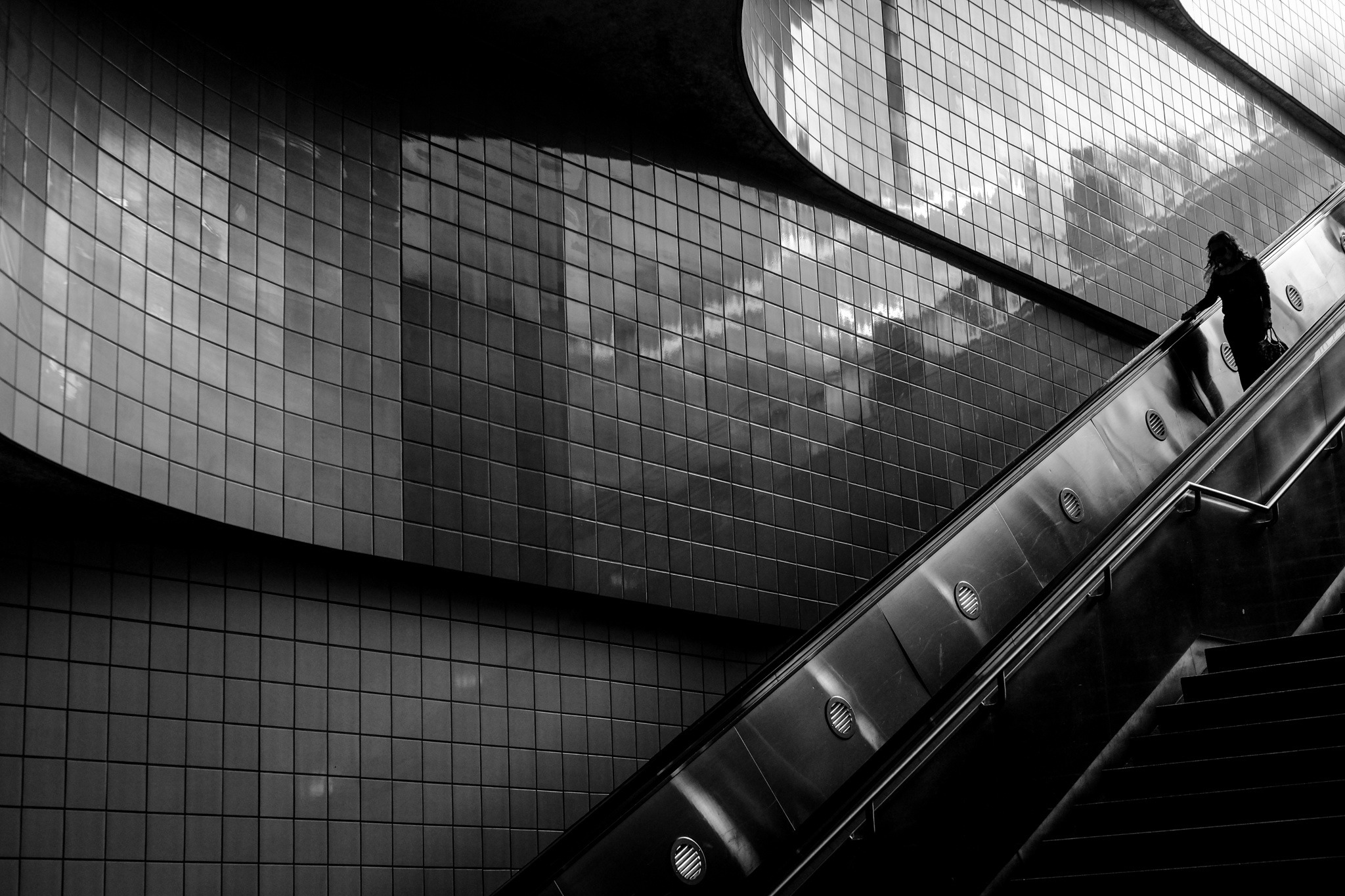
StreetShootr: Hi Rinzi, tell everyone who you are and what you are about.
Rinzi Ruiz: Hi, my name is Rinzi Ruiz. I live in Burbank, California which is right outside of downtown Los Angeles. I always enjoyed taking pictures ever since I was younger but it was really just vacation stuff with family and things like that. It wasn’t until around 2009-2010 that I got serious about it. I did some travelling and I was getting some cool stuff but I was noticing that at night the camera wasn’t producing very good shots. So, I started learning about aperture and shutter speeds and how to control what I was getting.
SS: So how did you go from snapshots to street photography?
RR: I found some content. Back then there wasn’t that much about street photography online. There was basically the Chris Weeks video on the human condition (https://vimeo.com/6497905) and a few little tidbits about what street photography was. I think I found in public (add link) as well but I didn’t know anything at that point. But I knew that when I was on vacation I enjoyed walking around, exploring, finding new things, getting lost, taking pictures of things that interested me. I remember I took a trip New York City that really kind of started it off for me because there it’s a pedestrian’s world there. It just sort of started from there.
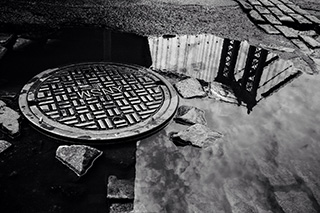
SS: New York is amazing. It’s almost like you get a free pass to shoot anyone. The people just keep on doing what they were doing.
RR: Exactly. But the weird thing about that was I was actually waiting for the scene to be void of people. More of an urban landscape, right? But it mixed that love for exploration, and being creative and seeing. And I loved that I could capture the things I was seeing instantly. So that part of it I was like, “Okay, this is cool. This is what I like about being able to do this,” and I can just go home and mess around with it a little bit in Lightroom or whatever program.
SS: So, at what point then did you realize you were a bonafied street photographer? Or that street photography was an actual thing that you wanted to create?
RR: Starting around 2010, I was starting to look at more photography that was labeled street photography. And I started looking at the masters and when I found Ray Metzker‘s work, I was like mind blown. I was like this is exactly down my alley. It reminded me of the kinds of things I used to draw before I started shooting and I decided to try to shoot stuff like that. It would be so much fun and I’d actually like my work.
Rinzi Ruiz On Color Vs. Black And White
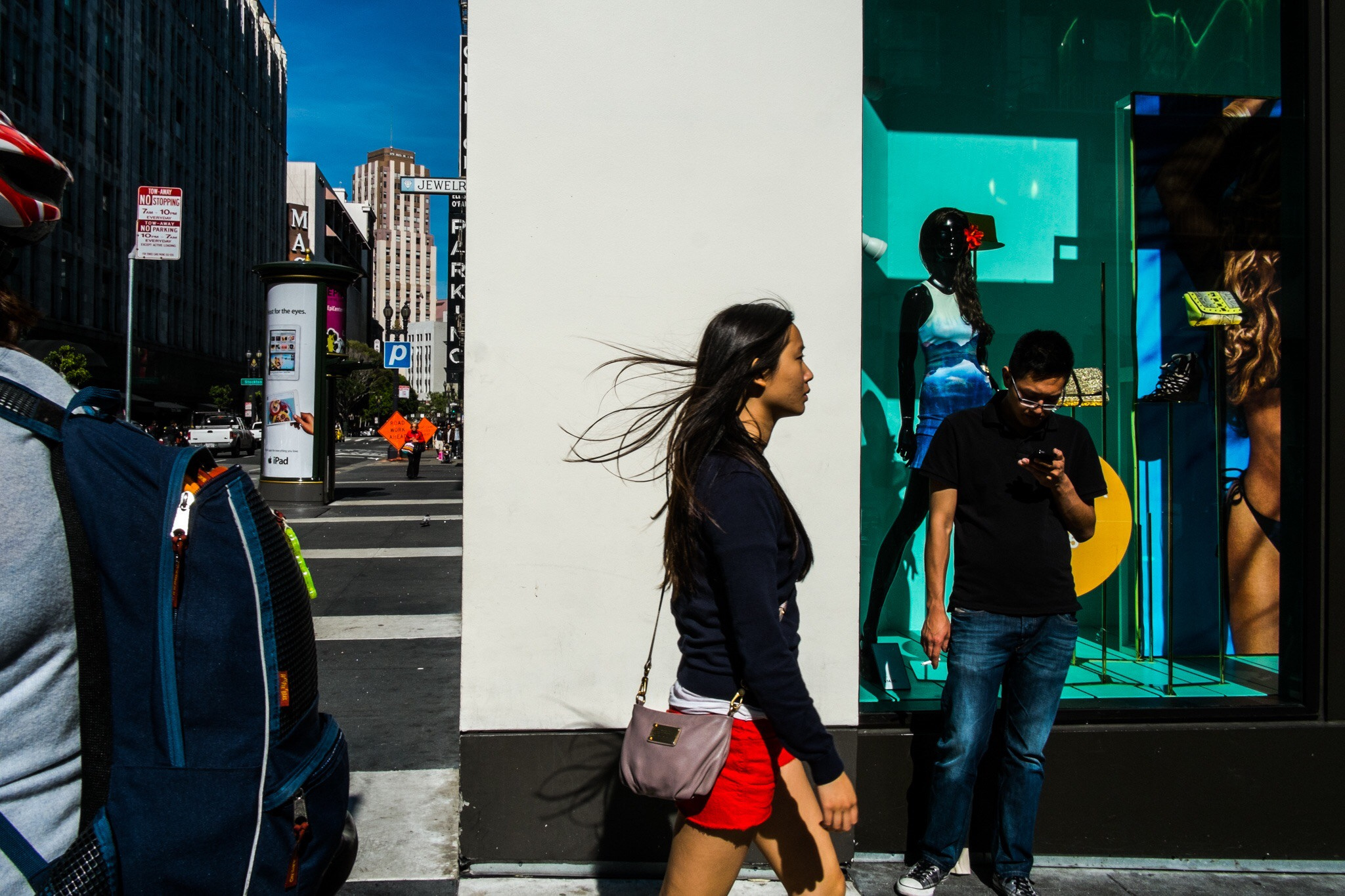
SS: Where you always interested in black and white?
RR: I remember when I first started processing in light room and there’s so many different things you can do. I played around with some black and white stuff and realized how much I liked it. Black and white just feels right to me. But then, I learned so much in black and white. There’s so much you have to learn with black and white to make it look a certain way and to do it right.
SS: It’s a different way of thinking about the light. You have to look for contrast instead of color and that’s not always easy to do.
RR: Right.
SS: When I first saw your work, I remember is seeing these towering cityscapes with tiny dots of humanity. It’s then since evolved and I see a lot more of the character of the people in your photographs. But there’s almost a poetic dance that’s happening with your subjects. Even if you catch someone in a still moment, they almost seem to be floating mid-gesture. Are you personally aware of the progression in your work?
RR: For me, it’s been a constant learning process and so it’s very interesting to hear what people have said throughout the last few years. In the beginning I was learning about light so a lot of it was just finding places where there were those shafts of light and seeing people walk from a distance. Back then, I was pretty worried about people noticing me taking their picture. But that went away with time and I started getting closer. I think a lot people see those those early shots and think they’re pretty somber or moody.
SS: I would say lonely. There is a sense of singularity in a lot of your images even if there’s more than one person in the frame. I don’t think it’s sad or depressing but it’s definitely stark. It’s almost like you’re making a statement that you might be in this crowded Metropolis but you’re still on your own.
RR: It’s interesting because that thought did come to me. You can know so many people but when it comes right down to it street photographers spend a lot of time alone. There have been times when I realized a whole week has gone by and I have not seen anybody or talked to anybody. I guess that has to come out in the work eventually.
SS: Let’s talk about your color work. You’re known as a black and white guy but a lot of this color work I’m seeing is really quite amazing. That’s not an easy switch to make.
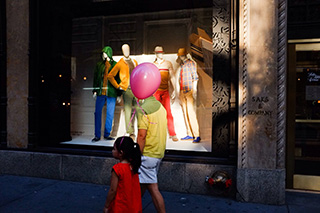
RR: I think that the fact that I focus on light and certain moments and certain little details and I don’t think about black and white really. I just shoot. Maybe my color stuff has an advantage because I think about light so much.
SS: I remember one shot from New York City with a father and daughter walking past a window with the balloon is covering the father’s head. The clarity with which the subjects work with the background, the gently humor and sense of place are excellent. Not sure that shot would work it all in black and white.
RR: Exactly. That’s what it comes down to is for me, yes, most of my work will be in black and white but there’s just certain photographs that just make sense in color and that’s for me to make that choice. Does it make more sense in color than in black and white? What did I see originally? Was it that balloon? Was it the red hat, the red scarf? Does it convey the right emotion? That’s what is going on in my head when I am deciding.
SS: That decision is a luxury that digital photographers have that film photographers never had.
RR: Even photographers that shot film back in the day did some kind of post processing. They dodged or burned. They cropped a little bit. It wasn’t like they got the picture in the camera and that was it. Why not use the tools that are available?
Rinzi Ruiz On Learning To See
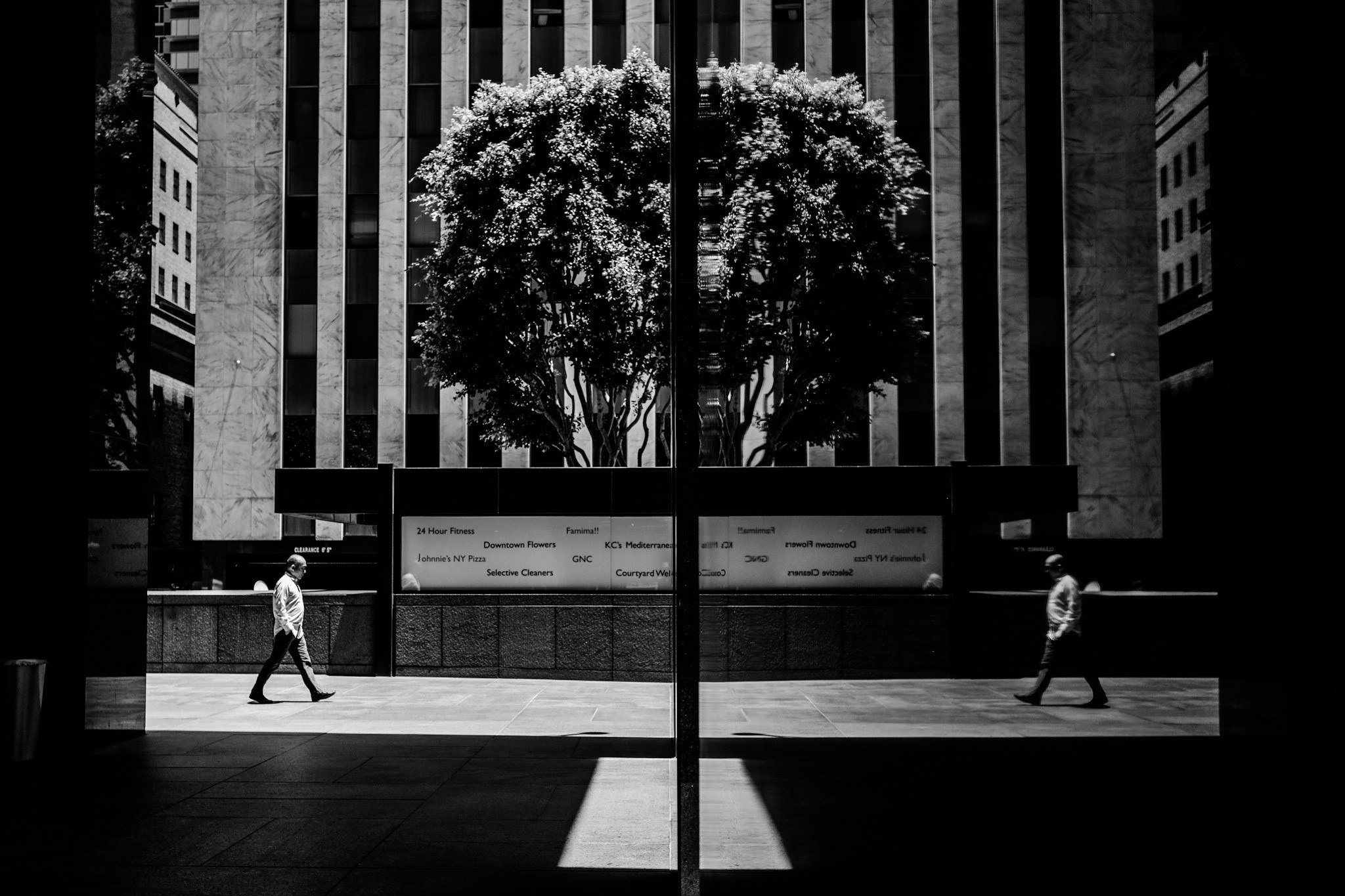
SS: What advice would you give new street photographers that are stuck in a rut and can’t seem to move forward with their work?
RR: I would suggest looking at a lot of pictures and try and learn what you like and what you don’t like. So maybe you start bookmarking photographers whose work speaks to you. Look for images that touch you emotionally in a certain way..
Keep looking at great photos and also learn composition. Not simple things like the rule of thirds or whatever. But try to develop a visual vocabulary of what works and what doesn’t work in your mind. Don’t try and repeat the images you love but think about why you like them and look for those patterns as you’re shooting.
SS: I agree with you 100%. It’s important for people to ask themselves why I like a picture. Try and form a sentence of why you like it. It’s not just because the color is pretty or the subject framed nicely but there’s going to be some emotional, intangible quality that makes it stand out as a really good photograph for each person…
RR: It’s what’s missing when people talk a lot about composition. You should understand what you actually like about a specific image. What works? What doesn’t work and what can be improved? Think about the emotional connection you have with that image and try to put it into words. It could be, “I don’t feel anything,” and that’s just as valid as “The colors made me feel happy.”
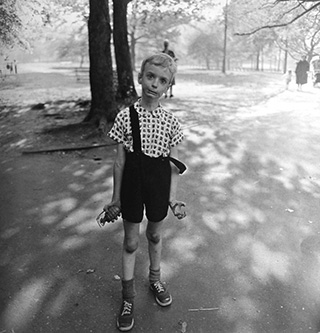
SS: Rules are meant to be broken, right? Think of something like Diane Arbus’s grenade boy. Put that picture in a typical street photography group and the first comment might be, “Shame about his head overlapping that person in the background, maybe if you took a couple steps to the left!” And the image would be considered a miss. There are intangible qualities that are outside the rules of composition. Great photographs are more than the sum of their parts.
RR: Exactly. But people love that image because of the emotional quality. Technically it might not be perfect but the content is so strong and that outweighs anything that’s wrong with the composition. I feel all the rules and guidelines are a great way to learn but once you kind of understand them, it’s okay to try to break the rules. Whether it just tells the story better or it just looks better your way. Make the choices and create images that people want to look at.
SS: I think rules of composition are sort of like learning how to write cursive. This is how an R looks. You can change it, make it your own. But essentially has to look that way in order for people to be able to read it. But that doesn’t help you make sentences. Photographs are sentences. Photobooks are paragraphs. So, the psychology of the frame becomes so important and that’s not something that can be taught. It’s something that you have to sort of absorb through lots of hard work.
RR: Yes. Another thing is observation. You got to observe and also feel for yourself. If you have no emotion whatsoever, it’s going to be hard for you to express that in your work.
Rinzi Ruiz On Enjoying The Process
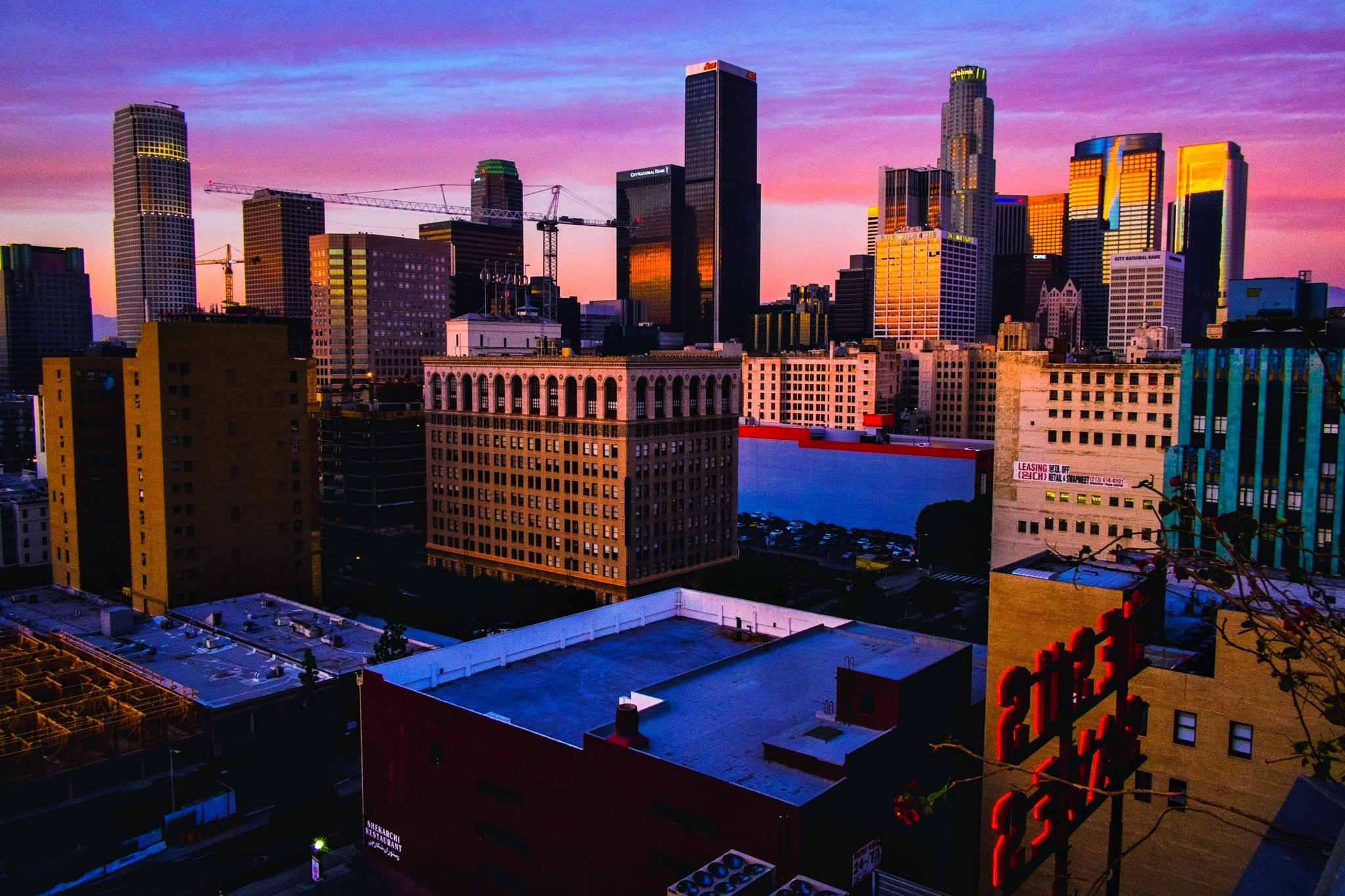
SS: How do you stay positive when you’re shooting on the street? The process has to be enjoyable because if I was only looking results, I would have stopped shooting ages ago. If you think about it, really good photographers have a keeper rate of around 1 in a 1000 shots!
RR: So, what keeps me going everyday out to shoot is the excitement that I get of learning something new about myself, about my photography, about how I am expressing myself. It is like a lottery. You never know what you’re going to get.
SS: I’m so glad you said lottery instead of box of chocolates.
RR: [Laughs] Well, let’s say it’s like fishing then. You can sit there and wait or walk around all day and you just never get a bite. But you know the fish are out there so you just keep on looking for the shot. And for me a big part of the excitement is that I don’t know what to expect.
SS: Order from chaos, really.
RR: Yes, exactly. Perfectly said. Enjoy the process. For me, it’s supposed to be fun. There’s a lot of talk out there. A lot of blogs that say get rid of the fear of shooting people. Really, that fear is only in your mind.
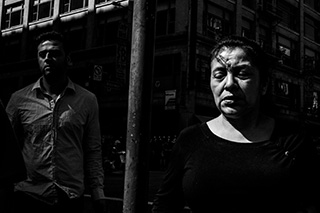
SS: I think that fear is such a small part of street photography. It’s like you have to break through that invisible barrier to make the images you want.
RR: Initially, I had a lot of concern and not more fear but like concern and inexperience. A lot of it is just putting in your mind that you’re doing it for fun; that you’re not doing anything wrong; and that you’re learning. When you’re saying you’re learning something, people are helpful. Approaching somebody and saying, “Hey, I am learning photography. Can you help me?” Or if somebody catches you taking a picture, “You know what, I am just learning right now.” You might be surprised what their reaction is. They’ll probably be like, “Okay.” It’s okay. Just keep learning, keep learning, keep learning, get better, and get better.
SS: The worst that’s going to happen is someone is going to not like that you took their picture. Be prepared to dissipate the confrontation.
RR: Definitely. But also know your country and what the laws are.
SS: Another good point! Well listen, we could keep this up all afternoon but I know you have a busy schedule. I want to thank you for taking the time to chat with me. It’s been a pleasure.
RR: That’s all good man.
Rinzi Ruiz is a Los Angeles based freelance photographer with a passion for street photography. In addition to his many professional services he also offers street photography workshops. Visit www.lastreetphotographyworkshop.com for more info.
Rinzi Ruiz on Flickr.
Rinzi Ruiz Photography.
All images © Rinzi Ruiz unless otherwise noted.

